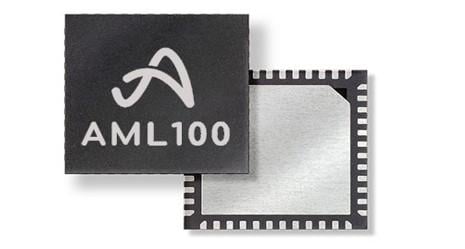The Best of Sensors Awards 2022 was held in San Jose, Calif. at the Sensors Converge conference in June. These awards are held each year to honor the best new products in the sensor ecosystem and the people and companies that design them. There were 14 categories of awards and the award in the AI/Machine Learning category was presented to Aspinity Inc. for its AML100 Analog Machine Learning Processor.
The AML100 is the first member of Aspinity’s analogML family and the company claims it is the world’s first fully analog machine learning chip. The AML100 reduces always-on system power by 95%. This means manufacturers can now extend the battery life of their devices and migrate always-on, wall-mounted devices to battery. This change opens a whole new class of products for biomedical monitoring, preventive and predictive maintenance, commercial and home security, and voice-first systems.

"We’ve long realized that reducing the power of each individual chip within an always-on system provides only incremental improvements to battery life,” said Tom Doyle, founder and CEO of Aspinity. “That’s not good enough for manufacturers who need revolutionary power improvements. The AML100 reduces always-on system power to under 100µA, and that unlocks the potential of thousands of new kinds of applications running on battery.”
Today’s always-on devices have a power problem. They continuously collect large amounts of analog data while they are monitoring an environment and digitize it immediately. Most of this data is irrelevant, so a lot of the power they expend is wasted. The AML100 minimizes the quantity and movement of this data by determining relevancy, with a high degree of accuracy while the information is still analog. This means the digital components of the chip can remain in low-power mode until truly relevant data needs to be processed. This means less digitization, digital processing, and data transmission and results in a 95% reduction in power usage.
There are several independent, configurable analog blocks (CABs) embedded in the AML100 that can be programmed to perform a wide range of functions, including sensor interfacing and machine learning. Compared to rigid analog approaches that address just one function, this versatility provides an advantage. The AML100 is flexible, allowing it to be reprogrammed in the field with new algorithms or software updates.
Initial AML100 models support four analog sensors, including microphones and accelerometers, as well as analog compression capabilities that are designed to boost wake-word engine accuracy. The AML100 is currently sampling to customers today and Aspinity is planning to produce the chip in volume in the fourth quarter of 2022.
Aspinity Inc. is headquartered in Pittsburgh, Penn., and is a leader in design and development of analog machine learning chips for battery-powered, always-on sensing devices. Its ultra-low-power, programmable, and trainable analogML technology delivers analog event detection that extends battery life in IoT, medical, and industrial applications.
For more information on the 2022 Best of Sensors Awards and a complete list of the winners, check out this article.